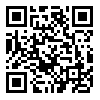| QR codes dead? |
| Written by Harry Fairhead |
| Friday, 01 April 2011 |
|
Has the QR code been superseded by Near Field Communications? Google thinks so but Microsoft doesn't. The problem is that users just don't seem to know very much about them.
If you know about QR codes then you must be of the opinion that, in the right situation, they are a valuable addition to the flow of data. Specifically you can use a QR code to get information from the real outside world to the electronic world, i.e. your application. If you have some smallish chunk of information to transfer to a mobile device then convert it into a QR code, print it out and let the mobile device scan it - or more usually take a picture of it. You can use QR codes to provide people with a URL that they can browse to, a download, geographical information, and address, telephone number and so on. And give that a QR code is just a pattern of dots it can be printed, engraved or installed on just about any object. But why am I telling you all this - if you are a programmer you probably get the QR code at once. However, it seems you are in the minority.
When asked as part of a recent survey, (MGH Feb 2011) 65% of users had seen a QR code but of those only 49% had actually used one, i.e. only about 31% of users had ever used a QR code. The average user doesn't know much about QR codes and the ones that do seem to think that they are just about getting discount coupons. Part of the problem could be that QR reading isn't something that is built into to smart phones as delivered. Basically the user has to know that they want to use a QR code and then find and download a QR code reader. Now it looks as if one of the biggest QR code supporters has defected to an alternative technology. Google has dropped QR codes from its Places business listing service. It also has just joined the NFC Forum - the group working to standardise Near Field Communication. Previously businesses listed on Places could print QR codes that when scanned took users to the appropriate web page. The assumption is that Google will be working some way of replacing QR codes with NFC. Instead of scanning a code, specially printed tags could be stuck to windows and read in by waving a phone a few inches away from the glass. The advantages of NFC are that you can get more data transferred, it can be secure and as long as the hardware is built into the phone it's easier. However NFC tags need a special printer and behave more like RFID devices. Put simply you can print a QR code on a T-shirt but you have to sew in a NFC tag. While other forms of barcoding have served industry well, it looks as if QR codes might not be what the mobile using public want. Not everyone agrees that printed codes are a bad idea, however. Microsoft has its own version of 2D codes - Microsoft Tag - and it still seems convinced that it's worth putting effort into competitions to encourage end users.
Google may have abandoned QR codes but it is often leading the charge into new technology. It is also worth noticing that QR codes are still supported by Google URL shortening service and it is difficult to see how NFC could replace the QR code in this situation. It is also going to take time to put NFC into the majority of mobile phones and in the intervening period QR codes and Microsoft Tag have a chance to educate their potential users. Meanwhile we need to think up some more creative used for 2D bar codes. Further readingQR codes deliver the Flamenco experience Getting started with Microsoft Tag Microsoft Tag and Barcoding in Color Google's URL Shortener API - the best?
|
| Last Updated ( Friday, 01 April 2011 ) |

